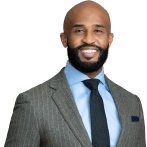Feeling connected and resilient in a professional environment can be challenging, even in the best of times. Add a pandemic plus a new hybrid work environment, and maintaining these pillars of community and professional growth quickly turned into a struggle that disproportionately impacted diverse professionals.
Katten recognized the need for its legal and business professionals to be heard, supported, and truly valued. Rather than opting for more Zoom time, the firm's Diversity, Equity and Inclusion professionals hit the road to facilitate connections in real time and in real life.
In a coast-to-coast program series, Katten gathered diverse groups of senior and junior attorneys for its 2022 Diversity, Equity & Inclusion Summit, "Reconnecting Katten on the Road."
The traveling summit, with stops at the firm's Los Angeles, New York, Washington, DC, and Chicago offices, focused programming and conversations on connectedness and resilience. Each visit featured remarks from firm leadership and partners, which were then followed by a workshop led by DEI consultant and expert Jackie Cranford of Cranford Advisory Services, LLC. In the workshop, Cranford covered a number of key areas, from exploring how to build relationships across differences and disrupt implicit biases, to how attorneys can inspire their mentors to invest in them. Workshops were followed by panel discussions featuring Katten attorneys who shared unique perspectives from their careers.
Summit participants left with a number of takeaways from the gatherings. For Paul Yong, a Litigation associate who served on a panel in LA, it was good to have time carved out to hear other people's experiences in a safe space to share.
Because everyone's perspective is different, from seniority and background to practice group, Paul found it particularly rewarding to have an open dialogue in a group setting. He's used to having one-on-one conversations. But the group dynamic, and the inclusion of a diverse group of summer associates, created a memorable event.
New York-based associate Elise Michael, Financial Markets and Funds, left the program with new ideas about mentoring. Specifically, she took away the idea that she could reframe mentors and sponsors as if they were her personal board of advisors.
The concept — envision mentors as a group and structure them like a board with a certain number of members with diverse perspectives to draw from — resonated with her.
Elise, a member of the firm's Kattalyst Sponsorship Program for high-potential diverse leaders, appreciated that the sessions and presentations stressed the importance of being proactive and staying in touch. As someone who is part of a formal sponsorship program, that point hit home. Through Kattalyst, the firm matched Elise with a senior partner in a similar practice area who is committed to helping support and advance her career. She benefits from hearing about her mentor's journey and the opportunity to bounce ideas off him, which she believes is key for her development as an attorney. To Elise, programs like Kattalyst are integral in building connectedness at the firm. The summit programming further reinforced professional relationships she's been making at the firm and beyond.
Creating a virtual culture and maintaining it has helped Elise to effectively build connectedness and resilience at work as the world continues to navigate the pandemic. It has broadened her Katten network, as she feels more connected with colleagues from other offices. Being able to use video conferencing for meetings has been an important tool for expanding her network.
For Financial Markets and Funds partner Carl Kennedy, one of the most valuable aspects of the summit was hearing from individuals with so many years of experience. This was particularly important for junior attorneys who got to hear the perspective of people who have a deep understanding of the industry.
The summit created an opportunity for the upcoming generation of leaders to discuss the difference between mentoring and sponsorship. In those relationships, Carl believes it is important for mentees or people being sponsored to follow through and take advantage of every opportunity.
Carl related a valuable discussion about imposter syndrome and how it is critical not to let that imposter fear deter you from success. Following the summit, Carl reflected on the process of choosing and connecting with mentors and sponsors. To Carl, mentors and sponsors don't have to look like you, and you don't have to share the same experiences. At the start of his career, Carl encountered very few diverse attorneys and none in his practice area. Instead, he connected with and learned from people who took time for him locally and in his practice. These were people he would meet with every day and every week.
The summit stressed the importance of meeting these personal and professional development goals: From building a strong network and finding the right mentor to creating inclusive programs. And for Paul, the programming reached beyond marketing lip service and led to mature conversations about the real struggles and challenges others are facing and overcoming. He looks forward to the next summit, ideally a combined gathering so that he and his colleagues can reinforce relationships close to home and across the firm.




